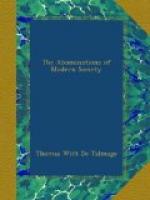The Church of God has not seemed willing to allow the world to have all the advantage of these games of chance. A church fair opens, and towards the close it is found that some of the more valuable articles are unsalable. Forthwith the conductors of the enterprise conclude that they will raffle for some of the valuable articles, and, under pretence of anxiety to make their minister a present, or please some popular member of the church, fascinating persons are despatched through the room, pencil in hand, to “solicit” shares; or perhaps each draws for his own advantage, and scores of people go home with their trophies, thinking that all is right, for Christian ladies did the embroidery, and Christian men did the raffling, and the proceeds went towards a new communion set. But you may depend on it that, as far as morality is concerned, you might as well have won by the crack of the billiard-ball or the turn of the dice-box.
Some good people cannot stand this raffling, and so, at fairs, they go to “voting,” sometimes for editors, and sometimes for ministers, at a dollar a vote. Now the Methodist minister is ahead; now the Presbyterian leads, and now the Baptist. But, just at the last moment, when one of the ministers of the more popular sect seems sure to get the prize, the members from some obscure denomination, that do not deserve the prize, come in, and by a large contribution carry off for their minister the silver tea-set.
Do you wonder that churches built, lighted, or upholstered by such processes as that come to great financial and spiritual decrepitude? The devil says: “I helped build that house of worship, and I have as much right there as you have;” and for once the devil is right.
We do not read that they had a lottery for building the church at Corinth or Antioch, or for getting up a gold-headed cane or for an embroidered surplice for Saint Paul. All this I style ecclesiastical gambling. More than one man who is destroyed can say that his first step on the wrong road was when he won something at a church fair.
The gambling spirit has not stopped for any indecency. There lately transpired, in Maryland, a lottery in which people drew for lots in a burying-ground! The modern habit of betting about everything is productive of immense mischief. The most healthful and innocent amusements of yachting and base-ball playing have been the occasion of putting up excited and extravagant wagers. That which to many has been advantageous to body and mind has been to others the means of financial and moral loss. The custom is pernicious in the extreme where scores of men in respectable life give themselves up to betting, now on this boat now on that—now on the Atlantics and now on the Athletics.
Betting, that once was chiefly the accompaniment of the race-course, is fast becoming a national habit, and in some circles any opinion advanced on finance or politics is accosted with the interrogatory—“How much will you bet on that, sir?”




